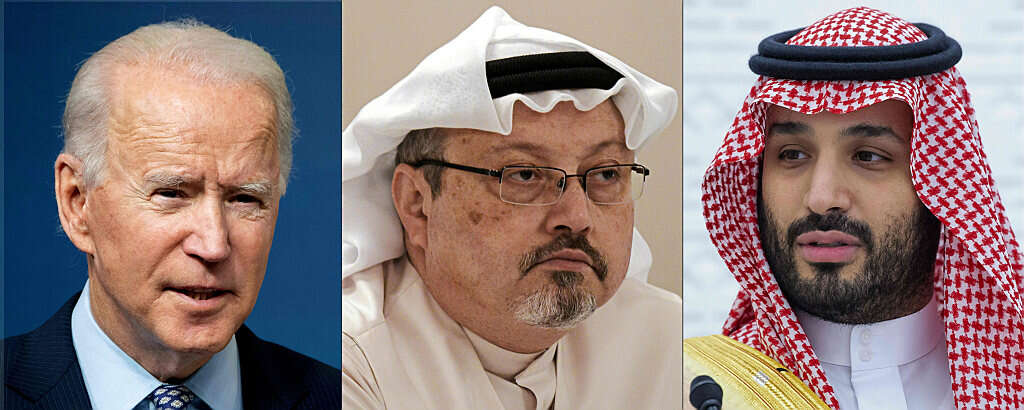The Biden administration announced sanctions and visa bans on Friday targeting Saudi Arabian citizens over the 2018 killing of journalist Jamal Khashoggi, but stopped short of imposing sanctions on Crown Prince Mohammed bin Salman himself.
Follow Israel Hayom on Facebook and Twitter
US President Joe Biden's actions in the first weeks of his administration appear aimed at fulfilling campaign promises to realign Saudi ties after critics accused his predecessor, Donald Trump, of giving the Arab ally and major oil producer a pass on gross human rights violations.
The partially-redacted four-page report released on Friday confirmed the long-suspected view that the 35-year-old future king had a personal hand in the elimination of one of his most prominent critics, a columnist and former Saudi insider who was living in exile in the US and used his platform to decry the prince's crackdown on dissent.
The assessment's release was accompanied by further actions from the Biden administration, including the unveiling of a new "Khashoggi policy" which is set to impose visa sanctions on individuals who, acting on behalf of a foreign government, engage in "counter-dissident" activities, including harassment, surveillance, and threats against journalists, activists, and dissidents.
A senior Biden administration official said the approach aims to create a new launching-off point for ties with the kingdom without breaking a core relationship in the Middle East. Relations have been severely strained for years by the war in Yemen and the killing inside a Saudi consulate of Khashoggi, a US resident who wrote columns for the Washington Post critical of the crown prince's policies.

Importantly, the decisions appear designed to preserve a working relationship with the crown prince, the kingdom's de facto leader, even though US intelligence concluded that he approved the operation to capture or kill Khashoggi.
"The aim is a recalibration [in ties], not a rupture. That's because of the important interests that we do share," the senior Biden administration official said.
The US Treasury Department placed sanctions on the former deputy Saudi intelligence chief, Ahmed al-Asiri, and announced a sanctions designation on the Saudi Royal Guard's rapid intervention force, or RIF.
The move freezes any US assets that the Saudi individuals held and generally bars Americans from dealing with them.
"Those involved in the abhorrent killing of Jamal Khashoggi must be held accountable," Treasury Secretary Janet Yellen said in a statement.
The United States also announced visa restrictions against 76 Saudi citizens as part of a new policy aimed at nations that carry out activities against journalists and dissidents beyond their borders. Such activities include efforts to suppress, harass, surveil, threaten or harm them.
The visa ban will also be selectively applied to family members, officials said.
"As a matter of safety for all within our borders, perpetrators targeting perceived dissidents on behalf of any foreign government should not be permitted to reach American soil," Secretary of State Anthony Blinken said in a statement.
A second US official noted that, although Saudi citizens were named in the first use of what the State Department called the "Khashoggi Ban" on visas, "it's really a new global tool."
Gulf states rally around Riyadh, reject US report
Saudi Arabia said it completely "rejects the negative, false and unacceptable" report.
In a statement, the Saudi Foreign Ministry said the kingdom's government "categorically rejects what is stated in the report provided to Congress and the assessments pertaining to the Kingdom's leadership, and notes that the report contained inaccurate information and conclusions.
"The crime was committed by a group of individuals that have transgressed all pertinent regulations... and the kingdom's leadership took the necessary steps to ensure that such a tragedy never takes place again. The Ministry of Foreign Affairs affirms that the partnership between the Kingdom of Saudi Arabia and the United States of America is a robust and enduring partnership."
The United Arab Emirates, Kuwait and Bahrain rallied around the Gulf power, echoing Riyadh's rejection of the American findings.
The Emirati Foreign Ministry expressed confidence in the Saudi judiciary rulings, which affirm the "Kingdom's commitment to implementing the law in a transparent and impartial manner, and holding all those involved in the case accountable.
"The UAE fully supports Saudi Arabia's ongoing efforts to establish stability and security in the region," the UAE said in its statement, stressing Abu Dhabi's rejection of "any attempts to exploit Khashoggi's case or interfere in the Kingdom's internal affairs."
Kuwait also supported the Saudi government, saying that "Saudi Arabia, under the leadership of King Salman bin Abdulaziz Al Saud and Crown Prince Mohammed bin Salman bin Abdulaziz, is playing an important role regionally and internationally in its rejection of violence and extremism," the country's foreign ministry said in a statement.
Bahrain expressed "its rejection of anything that would undermine the sovereignty of Saudi Arabia," the state-run Bahrain News Agency said, citing a government statement.
"Bahrain emphasises the importance of the fundamental role of Saudi Arabia under the leadership of the Custodian of the Two Holy Mosques, King Salman bin Abdulaziz of Saudi Arabia, and his Crown Prince, its policy of moderation regionally, in the Arab region, and internationally, its efforts to enhance regional security and stability, and promote global economic development."
Subscribe to Israel Hayom's daily newsletter and never miss our top stories!




